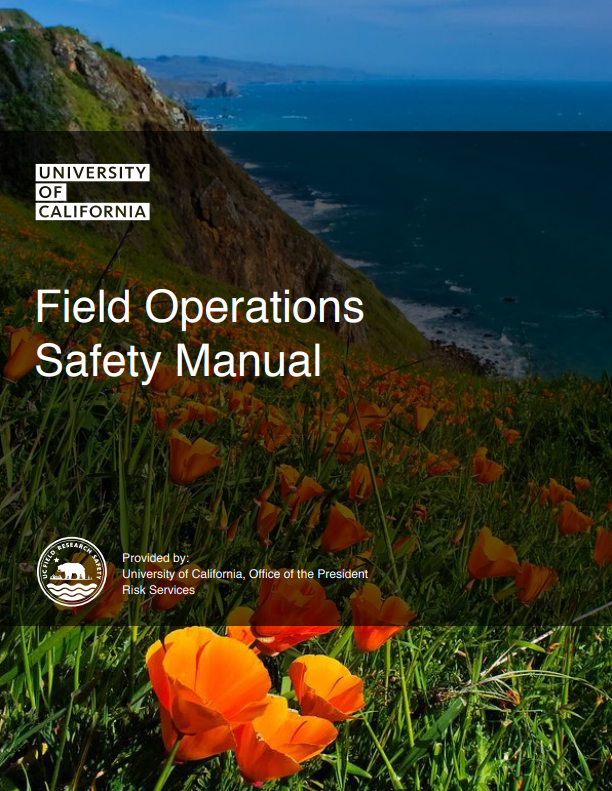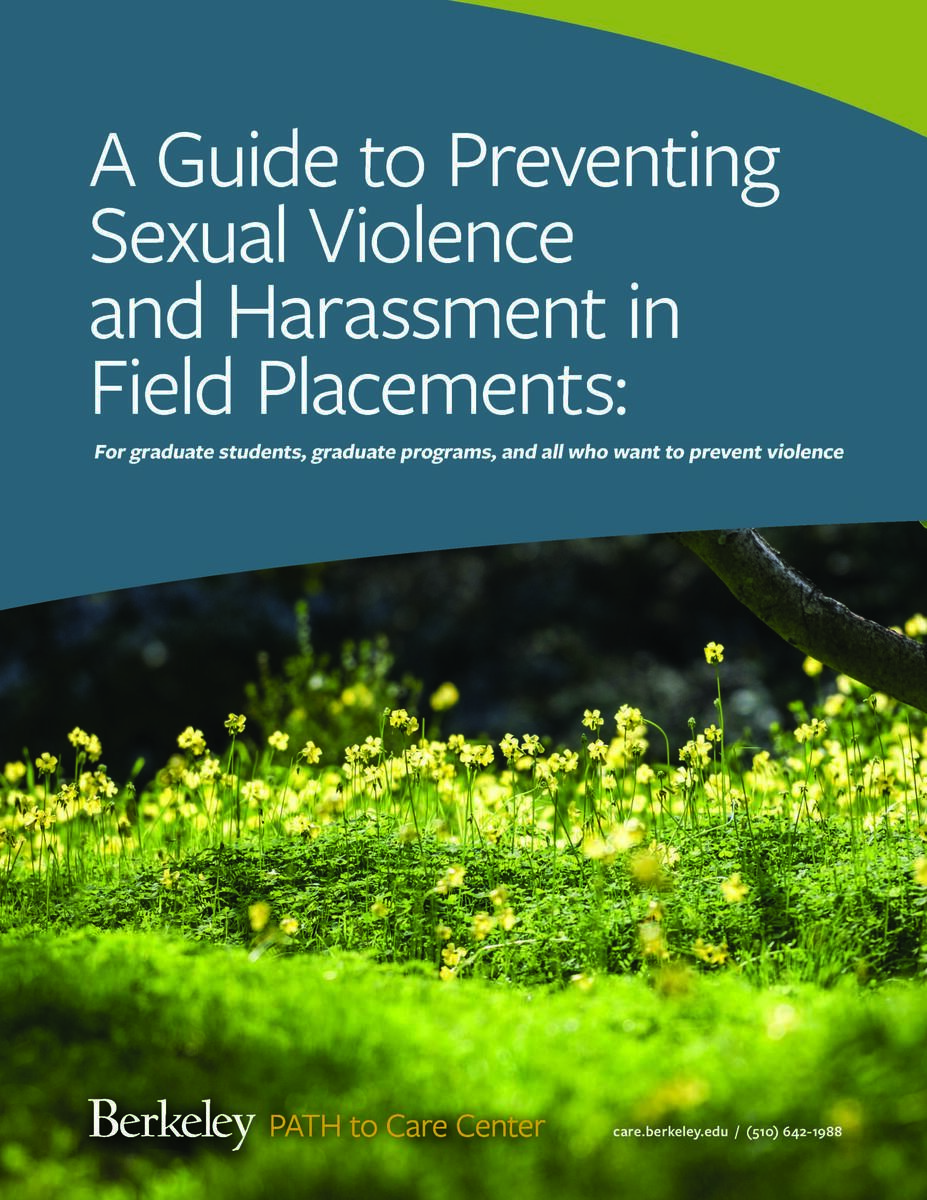Sign-up for seasonal field safety newsletter to stay informed about emerging hazards, best practices, and training opportunities by emailing fieldsafety@berkeley.edu. Past issues by topic are available on the UC Field Research Safety website.
The National Science Foundation (NSF) requires plans for safe & inclusive off-campus and off-site research, effective January 30, 2023. Learn more.
How Do I:
Know if I need a field safety plan?
A field safety plan serves as a tool to document your hazard assessment, communication plan, emergency procedures, and required training. Developing and using a field safety plan is part of the Cal/OSHA requirement of an effective Injury and Illness Prevention Plan (IIPP) for the following activities:
- Doing field research or teaching field courses off campus,
- Work or courses involving wildlife (UC Berkeley’s Animal Care and Use Committee (ACUC) will also verify that you have a Field Safety Plan), and
- Work performed at field stations or nature reserves. Established site procedures may by available, but should be supplemented with a safety plan for potential risks specific to your research or tasks.
- The National Science Foundation (NSF) requires plans for safe & inclusive off-campus and off-site research, effective January 30, 2023. Learn more.
Create a Field Safety Plan?
Fill out the EH&S Field Safety Plan Template. You should attach related documents as appropriate.![]()
Examples:
- Low hazard activities, cool climate - Redwood National Park
- Geography field course - Leonard Lake
- Short collecting trip - Yosemite Valley
Note: It is recommended that you start this process early in the planning stages of your field work to allow time to gather information, identify controls needed, and document training. Sections include:
- Site location and description
- Emergency services at the site
- Modes of travel and site access
- First aid considerations
- Travel preparations
- Participants and contact information
The Worldcue Trip Planner can help provide many location-specific details, e.g. endemic disease risks, local hospitals, and security alerts. When trips are registered at UC Away, travelers receive an email from Worldcue that provides a direct link to a personalized trip brief. Alternatively, you may access the Worldcue Trip Planner directly and use the ‘Location Intel’ tab to create a ‘Trip Brief’ or a ‘Security Brief.’
Free first aid kits are available to field research groups that complete a Field Safety Plan, while supplies last. See our First Aid Kits page for details.
Does my international travel need additional campus approval?
-
Pre-approval is required for certain types of university-related international travel, including travel to Department of State (DOS) Level 4 / 'Do Not Travel' destinations. Field researchers should review the US Department of State Travel Advisories for their destinations to determine if their plans require prior authorization beyond their home department. DOS Level 4 is the highest advisory level due to greater likelihood of life-threatening risks. During an emergency, the U.S. government may have very limited ability to provide assistance to travelers. Review campus travel guidance, protocols and approval processes before making fieldwork plans.
-
University employees are required to comply with United States export and sanctions regulations when traveling abroad with commodities, software, and technology. University employees should not engage in international travel, research, or collaborations until a determination of whether the activities are exempt from export control licensing or a license is obtained. Travel to sanctioned destinations for university research may be prohibited. Refer to Export Control: International Travel for guidelines, UCOP International Collaborations and Economic and Trade Sanctions (OFAC) for a list of sanctioned destinations, or contact the Export Control Office for more information.
-
It is the responsibility of the traveler and approving department to ensure the financial and health/safety risks associated with international travel are assessed before authorizing travel. Travelers should exercise particular caution about traveling to destinations that are restricted to US Government personnel in the DOS Travel Advisory, which may include some Level 3 destinations. Contact risk@berkeley.edu with questions about specific destinations.
Know what training I need to take?
Please take the following trainings:
- Heat Illness Prevention Training
- This is required for all outdoor workers.
- You may take the online heat illness training or review the Heat Illness Fact Sheet and document the training as part of your Pre-Trip Planning Meeting.
- First Aid Training
- For work in remote areas, Cal/OSHA requires at least one member of your group to have current first aid training.
- For example, NOLS Wilderness First Aid Training, 2-Day training offered by Cal Adventures; or similar courses are also available through NOLS, Foster Calm or Sierra Rescue.
- EH&S periodically sponsors training on campus; please email fieldsafety@berkeley.edu to be notified of upcoming training dates.
- Standard Adult First Aid, CPR and AED is also offered by Rec Sports.
- Wildfire Smoke Training
- This training applies to employees who work outside or in non-filtered buildings and/or vehicles for more than one hour per shift when the Air Quality Index for fine particulate matter (PM2.5) is 151 or greater.
- Complete the Wildfire Smoke Protection and N-95 Respirator training.
- UC Field Safety Leadership Training Series Library
- Improve your leadership and communication skills! The UC Field Research Safety Center of Excellence’s leadership training series features timely, challenging topics led by subject matter experts, presented online in workshop format with example scenarios, practice skills, and planning guidance to promote safe teaching and research outdoors, at remote sites, and abroad.
- Access the UC Field Safety Leadership Training Series Library.
Upon request, EH&S can provide in-person Heat Illness Prevention training and assist with development of your Field Safety Plan. Other training may also be required depending on your planned activities, e.g. fall protection, ATVs, hazardous materials shipping, etc. Please email ehs@berkeley.eduor call (510) 642-3073.
Prepare for my trip?
- Complete a field safety plan; consider environmental hazards and security risks prior to choosing your fieldsite.
- Complete Heat Illness, First Aid, or other training as appropriate for your location or tasks.
- Obtain immunizations if recommended for your destination (the Travel Clinic at the Tang Center requests you make your appointment 4-6 weeks in advance of your trip).
- Hold a pre-trip meeting to review your field safety plan, travel logistics, pack list (including first aid kit), etc. and cover any remaining training needs.
- Register trips via UC Away for travel alerts, travel insurance documentation, and evacuation services. Shortly after registration, you will receive an email from Worldcue that provides a direct link to a personalized “Trip Brief” and an insurance card with contact numbers for 24/7 travel assistance. If conditions change, or security alerts are issued while you are traveling, you will receive location-specific alerts via email from Worldcue (storm warnings, civil unrest, disease outbreak alert, etc.) Trip registration is required for university-related international travel, including field research. Trips booked via Conexxus are automatically registered.
- For international travel:
-
Review the US Department of State (DOS) Travel Advisory for your destination(s). Travel to State Department Level 4 / 'Do Not Travel' destinations requires further campus review beyond your department. See International Travel Guidance, Protocol, & Approval Processes for more information.
-
Follow the U.S. State Department guidelines to prepare for unexpected events abroad:
-
Enroll in the Smart Traveler Enrollment Program (STEP) to receive important safety and security messages and make it easier for the US Government to locate and assist you in an emergency.
-
Keep the contact details for the nearest U.S. embassy or consulate with you.
-
See the Traveler’s Checklist for more information.
-
-
Resources
Ship my research (hazardous materials)?
Check out our Shipping Research page.
Wilderness First Aid Training
Wilderness First Aid (WFA) training is sponsored by EH&S for field researchers and field course instructors. This hands-on first aid training is appropriate for researchers or trip leaders that work in remote areas, at least 30 minutes from emergency medical services or with limited communications.
The intensive 8 hour class should be taken as initial training, or as a refresher to practice skills and renew your certification.
2026 Training Dates:
- Saturday February 28 (132 Mulford)
- Friday April 10 (112 Hilgard)
- Friday April 24 (112 Hilgard)
All classes run from 8:30 am to 5:30 pm with a break for lunch.
EH&S hosts this 8-hour course taught by Sierra Rescue for UC field researchers and field course instructors. Dress warmly and bring water, snacks, and a lunch. Space for these trainings is limited, so pre-registration is required. Please use this Google Form Spring 2026 WFA Registration to sign up or contact fieldsafety@berkeley.edu with any questions.
The training includes CPR/AED certification. See the Course Outline (PDF).



